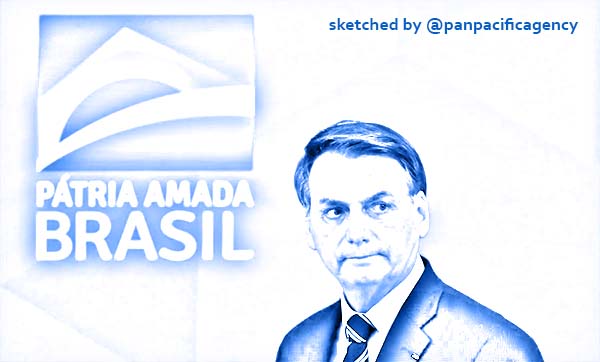Brazil’s much-needed economic reforms are being blown off course by the coronavirus

Brazil's President Jair Bolsonaro arrives for a press conference in Brasilia. AFP. Sketched by the Pan Pacific Agency.
SAN PAULO, May 15, 2020, CNBC. It’s a “pretty negative” picture in Brazil, one analyst has told CNBC, with politicians dismissing the current health crisis and economic reforms looking increasingly unlikely, CNBC reported.
The largest economy in South America has become a hotspot for Covid-19. It is currently sixth in the world in terms of countries with the highest confirmed infections, and its death toll is just under 14,000; according to Johns Hopkins University. However, with the World Health Organization saying the Americas are the new epicenter of the virus, Brazil could face even direr circumstances.
“It is a very worrying situation,” Raphael Boechat Barros, a psychiatrist at the University of Brasilia, told CNBC via email.
“We don’t feel safe, we are worried, the media keep talking about Covid-19, the economy is partially shut, and we see homelessness rising,” Barros said.
Brazil’s response to the pandemic has confused many. With a population of more than 209 million people, the federal government — led by President Jair Bolsonaro — has clashed with the country’s 26 states.
Bolsonaro, often dubbed the “Trump of the Tropics,” has not implemented nationwide lockdown measures to contain the virus. Rather, he has allowed state governors to decide for themselves what should be done. This has led to an uncoordinated approach across the country and political attacks between the president and governors.
“It is a polarized (political) environment,” Robert Wood, principal economist at the Economist Intelligence Unit, told CNBC Wednesday.
The measures taken by the governors “have been condemned by Bolsonaro,” he said, adding that the president has “dismissed the impact (of the pandemic) from the beginning.”
Bolsonaro, 65, has said if he were to catch the virus, because of his “background as an athlete,” he would only get a “little cold.”
More recently, when asked about the growing number of deaths, he answered “so what?” He added moments later he was sorry about the deaths, but questioned “what do you want me to do about it?”
Bolsonaro fired the country’s health minister, Luiz Mandetta, last month for supporting social-distancing measures at a time when the president was encouraging people to go to work.
The federal government was not immediately available for comment when contacted by CNBC.
Re-election in 2022?
“His game is to shore up is core supporters,” Wood told CNBC, mentioning the financial support given to poorer citizens and the greenlight that churches received to keep their doors open.
Brazil is due to have municipal elections after the summer and a new presidential vote in 2022.
According to Wood, Bolsonaro knows that his chances of re-election will be linked to how the economy performs going forward.
Brazil’s GDP (gross domestic product) could drop 4% in 2020, according to Fitch Ratings. Other economic forecasts point to a contraction of 5%.
“The economic outlook has deteriorated sharply due to rising external challenges including the global recession, China’s significant slowdown (a key trading partner), lower commodity prices and tightening external financing conditions,” the ratings agency said, in addition to a contraction in domestic activity and higher unemployment rates.
Furthermore, international investors were expecting key economic reforms that now seem to have totally stalled.
In the wake of the 2018 election and the appointment of Paulo Guedes as economy minister, expectations were that red tape would be reduced, the tax system would be updated, and there would be administrative reform of the state.
This is now “looking less likely,” Wood said.
“Brazil will enter 2021 with a very high debt pile and it will be difficult to attract foreign investment,” he added.